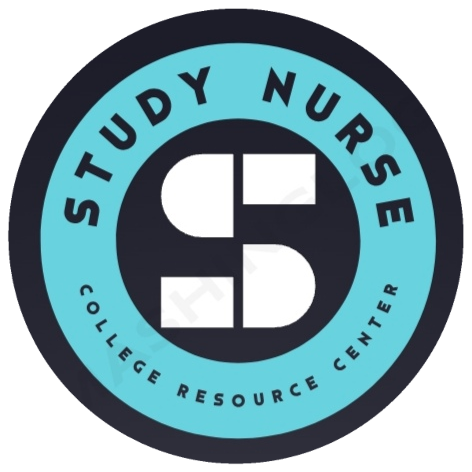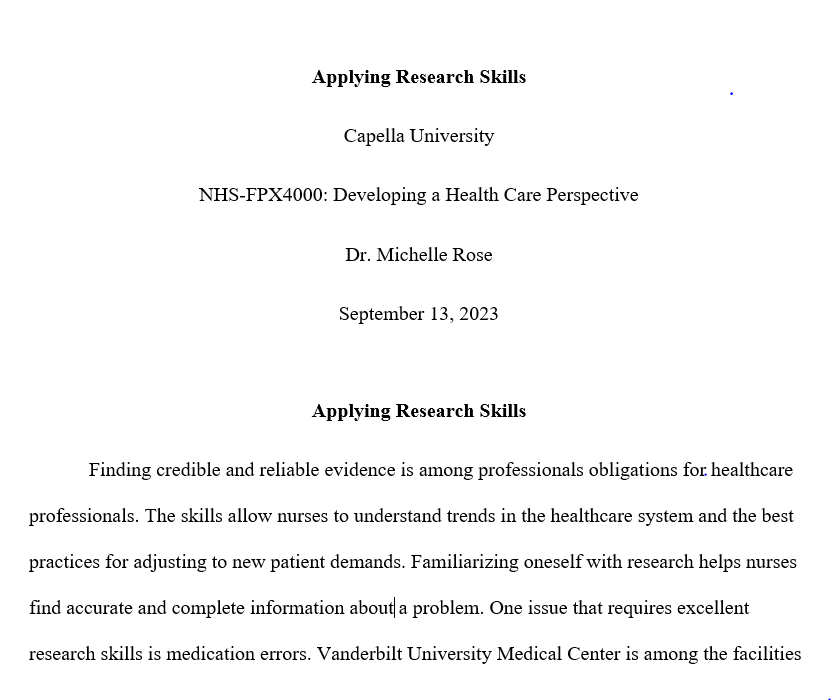Capella University
NHS-FPX4000: Developing a Health Care Perspective
Dr. Michelle Rose
September 13, 2023
Applying Research Skills
Finding credible and reliable evidence is among professionals obligations for healthcare professionals. The skills allow nurses to understand trends in the healthcare system and the best practices for adjusting to new patient demands. Familiarizing oneself with research helps nurses find accurate and complete information about a problem. One issue that requires excellent research skills is medication errors. Vanderbilt University Medical Center is among the facilities that experienced errors associated with nurses administering the wrong medication. Investigations revealed the absence of multiple safeguards necessary to enhance quality and safety of patient care.
Overview of the Topic: Medication Errors
Medication errors are preventable adverse outcomes arising when a patient takes the wrong medication or dosage. The incidents can cause serious harm, including severe complications and premature death. Medication errors also trigger financial, emotional and psychological distress associated with prolonged hospitalization, readmission and deterioration of one’s condition. An interest in the topic aligns with the need for increased vigilance to safeguard patients, families, healthcare professionals, and the organization from adverse outcomes. An experience with medication errors is from a case study where a nurse administered a wrong drug to a patient. The professional removed the wrong medication from a cabinet, ignored important warnings, and failed to monitor the patient’s signs after administering the drug. The patient died from an adverse drug reaction, thereby revealing the need for proactive and sustainable intervention for preventing medication errors.
Peer-Reviewed Articles Relevant to Health Care Issue
Using the Capella University Library database enhance access to peer-reviewed journal articles on medication errors. Nurses can access sources from authoritative platforms such as PubMed Central. Keywords such as medication administration, medication errors, medication safety facilitated access to several articles related to the topic. However, I limited the search to peer-reviewed journal articles published within the last three years.
The Credibility and Explain Relevance of Information Sources
The credibility and relevance of sources allow nurses researchers to make informed conclusions about a health issue. One approach for determining credibility is the role of independent reviewers in ascertaining objectivity and validity of methodology and findings. Secondly, the sources selected have findings published within the last three years. Thirdly, the articles are products of experienced scholars and researchers. To ensure relevance of sources, it is necessary to ensure that the purpose matches the topic and that the information relates specifically to medication errors.
Annotated Bibliography
Ahmed, Z., Saada, M., Jones, A. M., & Al-Hamid, A. M. (2019). Medical errors: Healthcare professionals’ perspective at a tertiary hospital in Kuwait. PloS one, 14(5), 17-23. https://pubmed.ncbi.nlm.nih.gov/31116773/
The article highlights patients’ vulnerability to serious adverse events associated with medication errors. Frequent errors cause prolonged hospital stays, life-threatening complications, and premature death. The authors identify common causes of errors such as high staff workload, limited support, stress, negligence, and inadequate training. Other causes are ineffective communication, poor interdisciplinary collaboration, and non-adherence to procedures and standards on medication administration safety. The incidents reveal the need for proactive and sustainable interventions to protect the organization from legal issues, increased costs, and poor health outcomes. The authors mention the relevance of voluntary and mandatory reporting to address risks within the clinical environment. Non-punitive measures, open communication, and adequate staffing are also necessary to enhance medication administration safety. The article is useful to nurse researchers focused on addressing administrative weaknesses and interventions for empowering the care team to identify and intercept errors. The reason for considering the source is the authors’ efforts to address medication errors from a healthcare professionals’ perspective. In this case, it is easier to capture human, technical, and administrative lapses based on experiences and observations made by nurses, physicians, and pharmacists.
Çetin, S & Cebeci, F. (2021). Perceptions of clinical nurses about the causes of medication administration errors: A cross-sectional study. Florence Nightingale Journal of Nursing, 29(1), 56-64. https://www.ncbi.nlm.nih.gov/pmc/articles/PMC8137725/
The article describes medication errors are incidents that begin from prescription and end with the patient receiving a drug. The scenarios threaten patient safety and are among the leading causes of mortality and morbidity. The authors provide statistics such as 1.5 million people affected by medication errors yearly and about 1.2 of 1,000 inpatient dying every year from the incidents. The common causes include miscommunication, negligence, distractions, and burnout. Inexperienced nurses also report high rates of medication errors. The findings encourage healthcare providers to enhance vigilance to identify administrative, technical, and human-related gaps and initiate timely solutions. The article is useful to researchers aiming to develop a comprehensive view of medication errors and system-related improvements necessary to enhance patient safety. Nurses can utilize important points such as the need for increased awareness about errors and skills such as timely reporting necessary for preventing undesirable outcomes. The reason for considering the source is the authors’ emphasis on nurses’ perceptions about medication errors. The findings provide evidence of issues in nursing practices and contributions made by nurses to reduce medication errors.
D’Errico, S., Zanon, M., Radaelli, D., Padovano, M., Santurro, A., Scopetti, M., & Frati, P. (2022). Medication errors in pediatrics: Proposals to improve the quality and safety of care through clinical risk management. Frontiers in Medicine, 8, 1-6. https://www.frontiersin.org/articles/10.3389/fmed.2021.814100/full
The article highlights the seriousness of medication errors as one of the widely reported incidents in hospitals. Errors include dispensing, dosage, and administration that increase health burden for patients, families, healthcare professional, and organizations. Increasing cases remind facilities to initiate solutions such as electronic prescription, training, and effective reporting mechanisms. The authors indicate that meaningful progress remains unreached despite efforts to understand vulnerabilities of patients to errors and adverse drug reactions. In this case, the authors mention the need for increased awareness about system defects and human errors. For instance, healthcare teams should develop risk profiles and initiate governance strategies to help reduce errors. The article also emphasizes the need for compliance with protocols, supervision, and excellent communication processes. Focusing on pediatric settings help practitioners understand severity of medication errors and interventions for maintaining a safe clinical environment. The source is relevant to the topic on medication errors since it describes the need for proactive clinical risk assessment. The process allows the care team to identify multiple lapses and interventions necessary to prevent adverse outcomes.
Salami, I., Subih, M., Darwish, R., Al-Jbarat, M., Saleh, Z., Maharmeh, M., Alasad, J. & Al-Amer, R. (2019). Medication administration errors. Journal of Nursing Care Quality, 34 (2), 7-12. https://pubmed.ncbi.nlm.nih.gov/29975215/
Salami et al. acknowledge the short and long-term consequences of medication errors. Increased frequency has severe implications on patient’s health, organization’s credibility, and staff morale. The authors address organizations vulnerability to wrong timing of medication administration, inadequate staffing during night shifts, and workload as leading causes of errors. The article describes the relevance of effective quality assurance programs in improving patient safety across the care continuum. The findings encourage organizations to utilize nurse educators to reinforce the value of medication rights. The article also stresses the impact of distraction-free nursing practices in enhancing quality and safety of patient care. The findings help nurse researchers make informed conclusions on adjustments to quality assurance aspects necessary to reduce occurrence of medication administration errors. Nurse researchers can utilize the study to address solutions for interruptions, poor reporting, inadequate supervision, and other challenges associated with increased frequency of medication errors. The consideration for selecting the article is its ability to describe system-wide lapses that undermine an organization’s ability to enhance patient safety. Nurses can make informed conclusions on priorities necessary to protect patients from adverse drug reactions.
Summary of Lesson Learned
Developing the annotated bibliography provided critical lessons on the best approaches for synthesizing credible and reliable findings on medication errors. Retrieving peer-reviewed journal articles from authoritative databases such as PubMed Central expanded my research skills. I learned about the multiple causes of medication errors, consequences on patients, healthcare professionals, and organization, and viable solutions. In the future, it will be easier to build a repository of credible and reliable scholarly articles relating to different issues in the healthcare system.
References
Ahmed, Z., Saada, M., Jones, A. M., & Al-Hamid, A. M. (2019). Medical errors: Healthcare professionals’ perspective at a tertiary hospital in Kuwait. PloS one, 14(5), 17-23. https://pubmed.ncbi.nlm.nih.gov/31116773/
Çetin, S & Cebeci, F. (2021). Perceptions of clinical nurses about the causes of medication administration errors: A cross-sectional study. Florence Nightingale Journal of Nursing, 29(1), 56-64. https://www.ncbi.nlm.nih.gov/pmc/articles/PMC8137725/
D’Errico, S., Zanon, M., Radaelli, D., Padovano, M., Santurro, A., Scopetti, M., & Frati, P. (2022). Medication errors in pediatrics: Proposals to improve the quality and safety of care through clinical risk management. Frontiers in Medicine, 8, 1-6. https://www.frontiersin.org/articles/10.3389/fmed.2021.814100/full
Salami, I., Subih, M., Darwish, R., Al-Jbarat, M., Saleh, Z., Maharmeh, M., Alasad, J. & Al-Amer, R. (2019). Medication administration errors. Journal of Nursing Care Quality, 34 (2), 7-12. https://pubmed.ncbi.nlm.nih.gov/29975215/

